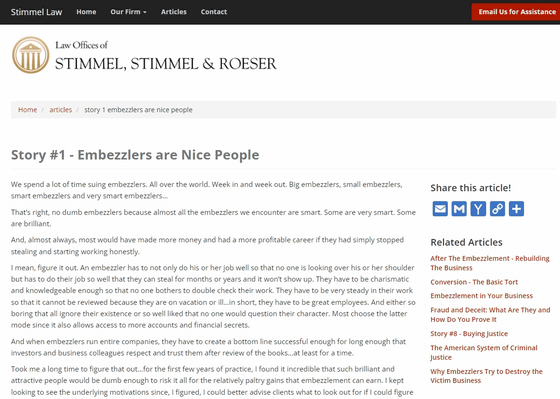Law firms say that many embezzlers are smart and talented

In a column, the Stimmel Law Firm, a long-established California law firm founded in 1939, points out that, based on their experience, very few people who embezzle are stupid, and that they would have earned more if they had stopped stealing and worked honestly.
Story #1 - Embezzlers are Nice People | Stimmel Law

The author of the column gives 'people who do their work carefully' as an example of someone who embezzles. This is because if your normal work is sloppy, your superiors and colleagues will double-check the work and find out that you are embezzling.
In addition, if you take time off due to illness or injury, there is a risk that the work will not add up if someone else takes over, so it is important not to take time off work.
And they need to be invisible or well-liked in the workplace so that no one suspects anything. Many people who embezzle choose to present themselves as good people so they can gain access to confidential financial information.
The image that emerged was of a 'talented, attractive employee,' and the author said he simply could not understand why such talented and attractive people would risk everything for a small profit.

After exploring the motives behind why people embezzle, the author came to the conclusion that 'they embezzle because they want to.'
I once had dinner with Eddie (not his real name), a former embezzlement case I handled that ended with a suspended sentence. When I asked him what he spent the embezzled money on, he replied that he spent it all on 'sweet, silly things to make life better' and 'things that are worth buying precisely because they have little value in the long run.'
When I asked him again if he really spent the entire amount, Eddie replied, 'The embezzled money should be used for luxuries, not necessities.' He then said he wanted to have a 'constructive conversation' and approached me about a business using real estate in Hong Kong.
When I got angry because I was not convinced about the settlement, Eddie said, 'If it's a good deal, you should accept it. It's better to have a thief you know than a thief you don't know,' and continued to talk about the business. When I asked, 'If you're going to do business with someone you can trust and be honest, don't you?' Eddie pressed on, 'So you don't advise your clients to have a system where employees check each other's work?' and 'Don't you tell them to create a system that doesn't allow them to cheat on the books or take the company's money?' When I admitted that I would tell my clients that, he refuted, 'Well, it's the same even if there are people you can't trust. If the system works, there shouldn't be a problem.'

In the end, I never got to handle Eddie's business, and he passed away about three years later.
The funeral of Eddie was paid for by people who had previously stolen his money, which shows how well-liked he was by those around him. He also said that he 'made a living by being a good person,' but when it came to business, he said, 'He didn't trust anyone, he didn't get caught as much as possible, and he just saw it as a way to make money,' and reflected, 'Eddie was someone who didn't understand that not everyone is in business just for the sake of making money.'
In the case of the Shiga Bank 900 million yen embezzlement case that came to light in 1973, it was reported that the embezzler was a model employee. The reason the embezzlement came to light was that the employee was transferred to another branch due to his excellent performance, and the fraud was discovered by another employee at his previous branch, which is exactly what the Stimmel Law Firm pointed out.
Shunzo Wakui, a writer known for the TV drama series 'Red Turnip Prosecutor,' has written a non-fiction book based on this case titled 'The Bank on Trial: The Shiga Bank 900 Million Yen Embezzlement Case.'

Related Posts:
in Note, Posted by logc_nt







